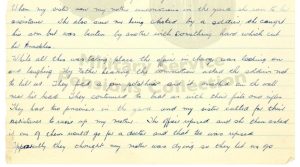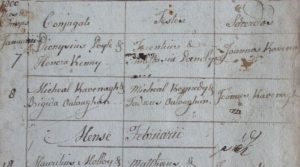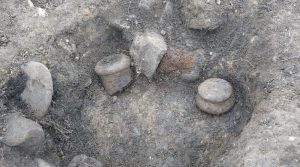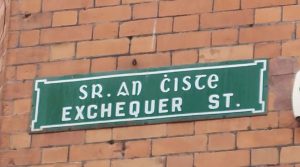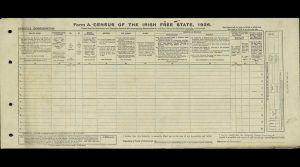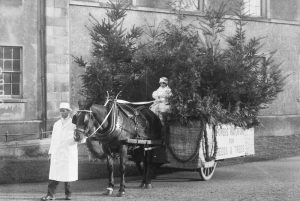Not far from Newtownbutler, Co. Fermanagh, a harmless Halloween prank in 1916 turned tragic when 13-year-old Joseph Jackson was fatally shot, leading to the manslaughter trial of Thomas Storey.
Halloween was traditionally a time for pranks – cabbages were thrown at doors, chimneys were blocked and gates were removed from their hinges, all in the spirit of fun and mischief. But innocent pranks can quickly escalate into unforeseen tragedies. The sad story of 13-year-old Joseph Jackson’s untimely death serves as a reminder of this reality.
A D V E R T I S E M E N T
Joseph was born on 27 April 1903 in the townland of Clonmackan, between Newtownbutler, Co. Fermanagh and Clones, Co. Monaghan, to Eliza Anne Jackson (née Kennedy). Named after his father, Joseph came into the world under a shadow of tragedy – only months before his birth, his father, a railway worker, had died after being struck by a train on 18 December 1902.
Five years later, Eliza remarried agricultural labourer James Madill from the nearby townland of Coleman Island. Joseph had an older brother, James Jackson and three younger half-siblings from his mother’s marriage to Madill: Mary Anne, Elizabeth and George. Presumably owing to Madill’s work, the family moved around a bit but always remained within a small cluster of neighbouring townlands on the Fermanagh/Monaghan border, which included Colman Island and Clonagun.
>>> YOU MIGHT ALSO LIKE: Mourning and warning: tracing the banshee in Mayo lore
On Halloween night, 1916, what began as a harmless gate-stealing prank carried out by a group of friends took a dire turn, which led to the death of young Joseph Jackson. According to his death record, the boy died from a revolver bullet wound in the region of the heart; it noted that he “lived 20 minutes” and an inquest held shortly after, on 2 November, deemed his death “not accidental”.
The other key figure in this story is Thomas Storey, aged 24 at the time of the incident. The Storeys were the target of the initial prank. Thomas lived with his elderly father, also Thomas, on the family farm in the townland of Clontivrin, which borders both Clonmackan and Clonagun. Joseph’s mother was originally from Clontivrin and both families were part of the local Church of Ireland community and would have no doubt known each other well.
Sign up to our newsletter
The following report, originally printed in the Ulster Herald in December 1916, recounts the events surrounding this Halloween horror and the subsequent court proceedings; reproduced in full here, it serves as a reminder that real life can often be scarier than the most chilling ghost stories shared at Halloween.
Ulster Herald, 16 December 1916:
Hallowe’en tragedy – Fermanagh manslaughter case
At the Ulster Winter Assizes in Belfast on Thursday, before Mr Justice Gordon, Thomas Storey, jun., was arraigned on an indictment charging him with the murder of Joseph Jackson on 31 October 1916, near Newtownbutler, Co. Fermanagh.
Messrs Moore, K.C., M.P. and Smith, K.C. (instructed by Mr James Riordan, Crown Solicitor for Fermanagh) were for the prosecution, and Mr T. W. Brown (instructed by Mr M. E. Knight) for the defence.
Prisoner when arraigned said he was prepared to plead guilty to manslaughter.
A D V E R T I S E M E N T
Mr Moore said the Crown acquiesced. Under the Criminal Justices Administration Act, 1914, it was provided that where a prisoner could be convicted of some other offence not charged in the indictment he was at liberty to plead not guilty of the offence charged in the indictment, but guilty of the other offence. That covered the present case. The Crown could not press for a conviction on the capital because there was no suggestion of motive or malice, and, indeed, the offence of which the prisoner was guilty might be described as criminal recklessness. The two men were on quite good terms, and, according to the doctor’s evidence, the bullet which caused death evidently ricochetted off the road, and was not fired directly at Jackson.
Mr Brown said this occurred on a Hallowe’en night, when the young men of the countryside were in the habit of playing tricks, such as the removal of gates and doors from various premises. Storey found half the gate of his father’s farm removed, and in order to play a trick back upon those who did it, he got his revolver and followed them upon a bicycle. He fired the shot well away to the right of them, and not with the intention of doing any harm, but
unfortunately the bullet glanced off the road
Prisoner worked the farm for his father, who was 83 years of age, and he bore a high character. There was a petition on his behalf from the residents in the district of all classes and creeds. Compensation such as was possible had already been paid, and the accused had been in prison for five weeks.
A F F I L I A T E A D

A number of witnesses, including the stepfather of the deceased, gave evidence of character.
His Lordship said the use of a firearm in this way was the element in the case which caused him difficulty. It would be a great misfortune if people got into their minds that revolvers and pistols could be used recklessly as to kill or injure, and that no punishment would follow. He would postpone pronouncing sentence.
Storey liberated on bail
Thomas Storey, jun., who had pleaded guilty the previous evening to the manslaughter of Joseph Jackson, at Clonagorn [Clonagun], near Newtownbutler, was put forward on Thursday morning.
Mr Justice Gordon said the case had given, and was giving him very great concern. Prisoner was a young man of very good character and repute in the neighbourhood in which he lived. That was shown by the evidence of the various people examined the previous evening, and he (the judge) was satisfied that Storey did not intend to kill or wound anyone. The shot, so far as he could gather, was not fired directly at the boys, but was fired to the right-hand side, whereas they were to the left. The bullet must have glanced off a stone or other hard substance, and then struck the poor boy. The doctors proved it came in an upward direction, and their idea was, having regard to that and to some marks on the bullet which could not have been caused by entering the boy’s body, that it must have glanced off something.
The boy’s stepfather had come to court, and said he did not want the accused punished, and there was received an appeal signed by a great many people in the district, which he thought, was quite natural, having regard to the prisoner’s character. It was also stated that he managed the small farm for his father, who was an old man.
A D V E R T I S E M E N T
However, it gave him great concern that he had fired a shot from a revolver. People ought not to use those deadly weapons without having some justification for it. It would be better, indeed, not to have them at all, and it would be a most unfortunate thing if the community should imagine that when a man chose to fire a revolver and something happened that he did not expect at the moment he could get off scot-free.
However, the circumstances in that case were very exceptional, and the prisoner’s character was exceptionally good. After the most careful consideration he thought he could allow him out without inflicting any present punishment upon him. He hoped the affair would be a warning to him for the rest of his life, and that he would give up that revolver and any other firearms he had. He understood his father had made some compensation to the boy’s relatives. Taking all the circumstances into account he would allow the accused out under a rule of bail in £20, and he trusted the entire affair would be a lesson to the community, not to use firearms in that reckless manner.
Prisoner was then liberated.
Sign up to our newsletter
Advertising Disclaimer: Irish Heritage News is an affiliate of FindMyPast – we earn commissions from qualifying purchases. This does not affect the amount you pay for your purchase.
READ NOW
➤ Forgotten ghost story by Dracula author Bram Stoker rediscovered in Dublin library
➤ Learn to make colcannon, Ireland’s traditional Halloween dish
➤ Navan’s unusual horse grave and the pagan Viking horse cult
➤ 2,000-year-old Bellaghy bog body discovered during excavations in Derry
➤ Mourning and warning: tracing the banshee in Mayo lore
A D V E R T I S E M E N T




